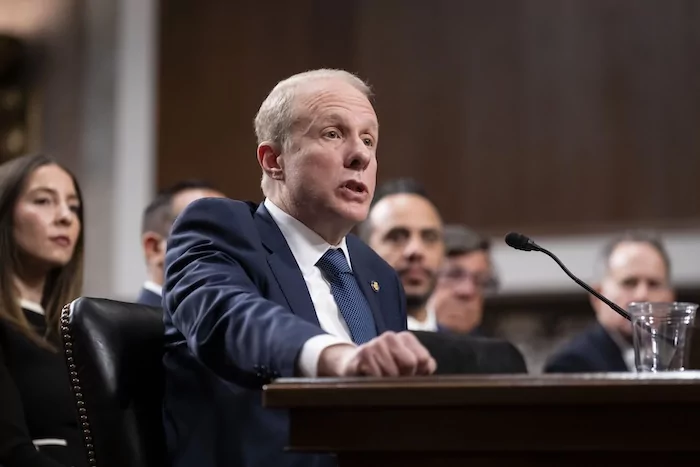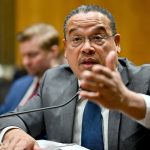President Donald Trump‘s nominee to serve as the deputy secretary of defense declined to clearly acknowledge that Russia invaded Ukraine during his Senate confirmation hearing Tuesday.
Stephen Feinberg, who was the co-founder and co-CEO of Cerberus prior to his nomination to be the Pentagon’s No. 2, is the latest member or nominee of the administration to dodge questions of Russia’s culpability in the war it escalated three years ago.
Upon questioning from Sen. Mark Kelly (D-AZ), Feinberg explained, “I do think the deputy should, at times, give his view on policy. For sure, I think it should be behind closed doors and not in public.” He then referenced that sentiment when asked moments later by the senator about whether Russia invaded Ukraine.
“Well, going to my behind-closed-doors statement a second ago, I’ll just say this, the — ,” the nominee said before getting cut off by Kelly, who stated, “[the Russians] moved tanks and troops and armored personnel carriers across the Ukrainian border. It’s a pretty simple question.”

“There’s a very tense negotiation going on now. It’s important for American interest,” Feinberg stated, adding, “Well, what I was trying to say, senator, is I don’t think some person not informed on this, not involved in discussions, should make statements public that could undermine what the president and secretary’s intent is.”
He was asked again later in the hearing by Sen. Tammy Duckworth (D-IL) whether Russia invaded, to which he said, “I don’t feel that I should publicly comment in the middle of a tense negotiation when I’m not privy to the facts.”
Feinberg’s unwillingness to say whether Russia invaded Ukraine is reflective of the Trump administration’s current refusal to blame Moscow for the war, but whether Russia invaded Ukraine is unquestionable.
Russian forces currently occupy about one-fifth of Ukrainian territory, have held sham referendums in multiple Ukrainian cities, and its military has suffered more than 600,000 casualties over the three years of the war, the overwhelming majority of which occurred in Ukrainian territory.
Several other administration officials, however, have indicated, as the president said directly, that somehow Ukraine is responsible for provoking it, though even that view has been widely repudiated as an inaccurate portrayal of the beginning of Russia’s full-scale invasion.
Over the weekend, Secretary of Defense Pete Hegseth was asked whether Russia was provoked into invading Ukraine three years ago, to which he answered that it’s “fair to say it’s a very complicated situation.”
Trump’s Middle East envoy, Steve Witkoff, said Russia was “provoked” to invade Ukraine over the weekend, while Mike Waltz, the president’s national security adviser, declined to say last week whom the president believes is “more responsible for the Russian invasion of Ukraine,” and whether Trump believes Russian President Vladimir Putin is a “dictator” because Trump called Ukrainian President Volodymyr Zelensky one.
The unwillingness to attribute responsibility for Russia’s invasion of Ukraine coincides with the administration’s push to end the war, however it appears as if they’re doing it by getting closer with Moscow.
U.S. and Russian senior officials met last week in Riyadh, Saudi Arabia, to initiate the conversations, and the leaders agreed to start the resumption of diplomatic missions. Following the meeting, Secretary of State Marco Rubio teased the possibility of “incredible opportunities” that the United States and Russia could partner on if the war “comes to an acceptable end.”
The U.S. notably voted against a United Nations General Assembly resolution Monday about the war that blamed Russia for invading, and they were joined by Russia, North Korea, and more than a dozen other Moscow-aligned nations.
The Trump administration is pursuing a separate agreement with Ukraine over its rare earth minerals, which officials have said could be agreed upon in the coming days. The U.S. would partner with Ukraine to improve its capabilities of extracting those minerals in exchange for hundreds of billions of dollars over time, which is meant to reimburse the U.S. for the military assistance it provided to them over the course of the war.
US-UKRAINE RELATIONSHIP REACHES INFLECTION POINT ON THIRD ANNIVERSARY OF WAR
When Zelensky declined the U.S.’s initial proposal, it spurred Trump to publicly criticize him, calling him a “dictator without elections” who was responsible for Russia invading his country.
Zelensky then accused Trump of living in a “disinformation space,” which angered Trump, who responded with similar remarks.























